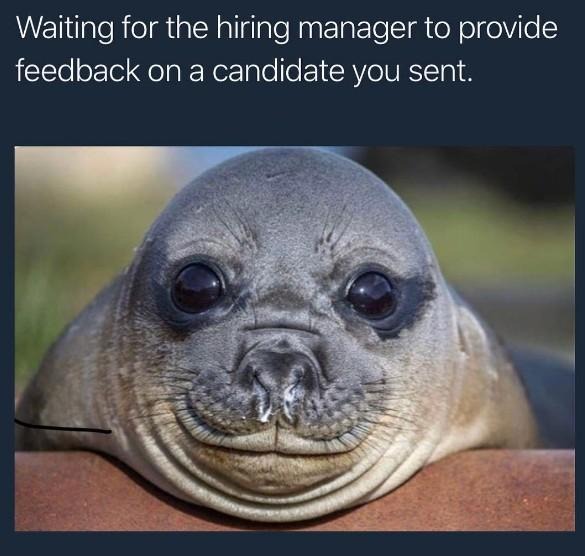The difference between hiring manager vs recruiter is that hiring is a risky business. It may not look that way to the undiscerning eye, but hiring is the most high risk and high reward activity in the business world. And now more than ever, finding and retaining qualified employees is a top priority for most companies. But to attract, vet, hire, and onboard talent, you will need the help of two key parties: hiring managers and recruiters.
Then why all the noise on hiring manager vs recruiter, when instead they are required to work well together on a high-stakes operation?
Hiring Managers and recruiters share a common goal - to find great candidates as quickly as possible. And when a new hire turns out to be a star employee, but recruiter and hiring manager pat themselves on the back for a collaborative work that was smooth, effective, and well-done.
On the other hand, a bad hire raises questions on who was really responsible for the selection of such a candidate. Who needs to improve their recruitment tactics for next time? Quite often, the relationship between recruiter and hiring manager is fraught with tension - Hiring managers might complain about a low-quality shortlist of candidates, while recruiters could struggle to meet high expectations set by hiring managers.
The relationship between these key players is tense. Following explain the points of hiring manager vs recruiter. But before we get to that, let’s clear the air on who is really responsible for hiring the right people.
What does it mean to be “responsible for hiring”?
Now you must be saying, “What is the difference between hiring manager and recruiter? Po-ta-to, po-tah-to, right?” to answer what is the difference between hiring manager and recruiter is a fine line between one being responsible for the process and the other being responsible for the outcome of the process.
Now, when we talk about the “responsibility in hiring,” it refers to the outcome of the process, i.e., the person that gets hired, and not the entire process, i.e., the journey up until the point the hiring decision is made. In those terms, it is the recruiter who manages the hiring process and the hiring manager who makes the final hiring decision.
While hiring is best done as a collaborative operation, it is the role of the hiring manager that has to hold the outcome of the recruiting process. Therefore, when a bad hire happens, it is the duty of the manager to investigate the issue and craft better recruitment measures.
Also read : 10 Ways to Annoy Your HR Manager
What does a Hiring Manager do?
In this whole role of hiring manager vs recruiter debate, let's take a look at the job responsibilities of a hiring manager can vary depending on whether they work alone in a small business or with recruiters or HR professionals. But, regardless of the variations, the common job responsibilities of a hiring manager includes the following:
1. Identify vacancies:
Hiring managers identify current or future job openings in order to advertise for qualified candidates.
2. Create job adverts:
Once an open position has been identified, hiring managers will create a job description and job posting to help them find qualified candidates.
3. Collaborate with others:
Some hiring managers work with human resources employees or recruiters to find suitable candidates.
4. Evaluate resumes:
Hiring managers typically review resumes and applications as they come in from recruiters or directly from applicants.

5. Interview candidates:
Conducting interviews and vetting potential employees for suitable open positions is one of a hiring manager's primary responsibilities.
6. Negotiate contracts:
Some hiring managers will assist with contract or salary negotiations after a candidate has been chosen.
7. Assist with onboarding:
Most hiring managers will schedule the new hire's orientation, onboarding, and training, especially if the new hire will be joining the hiring manager's specific team.
What does a Recruiter do?
In the debate on the difference between hiring manager vs recruiter, while the hiring manager is ultimately responsible for the outcome, it does not mean that the role of a recruiter is insignificant. The role of a recruiter is to lay the groundwork for hiring the best candidates. Regardless of the industry or the type of organization, these are the common job responsibilities of a recruiter:
1. Create a recruitment strategy:
The job responsibilities of a recruiter is to develop a strategy to find the best candidates for the open position after consulting with a hiring manager. This could entail making online contacts and attending conferences to expand their network.
2. Maintain job postings:
Recruiters advertise open positions on their company's website and on job boards.

3. Screen applications:
Recruiters review prospective candidates' applications and resumes before conducting phone interviews with the most qualified.
4. Assist with onboarding:
After a candidate is hired by the company, the recruiter may assist with onboarding the new employee.
Hiring manager vs recruiter? Collaboration is the key
While we now understand the clear roles and responsibilities of both parties, we are still not over the hiring manager vs recruiter debacle. Recruitment manager and hiring managers play different, but, complementary roles in the recruitment process. When both parties understand their roles and collaborate well together, it can lead to a strong and successful relationship between recruiter and hiring manager.
In the hiring manger vs recruiter debate there's a common goal - to bring in talented and qualified employees into the team. And when both key players are aligned on their goals and objectives, the hiring process can go smoothly. Here’s how recruiters and hiring managers can collaborate to find the best candidates:
1. Conduct a thorough intake
The first meeting between a recruiter and a hiring manager, known as a "intake," establishes the search's expectations and kicks off the hiring process. Hiring managers should inform recruiters about their team and the position the role will play within it, as well as the qualifications and experience required. This provides recruiters with a starting point by narrowing the search parameters, as well as the background knowledge required to successfully engage with candidates. Recruiters, in turn, can assist in the establishment of a timeline and the formulation of an overall recruiting strategy.
2. Sell the company brand
Because your company would not exist without its employees, recruiting should be a key component of your overall business strategy. Encourage the recruiter and hiring manager to broaden their reach by communicating their hiring requirements to their company's teams and network.Whether you hire the candidate or not, every interaction with him or her is an opportunity to sell your company. Recruitment managers and hiring managers must conduct themselves as salespeople who never stop selling. A candidate may receive referrals or even become a client down the road. Companies that can sell their culture and the opportunity at hand form the most effective teams.
3. Establish a Communication Culture
To be effective and efficient, recruiters and hiring managers must maintain constant contact with one another, and holding post-interview debriefs via phone, video call, in person, or by adopting a collaborative hiring software, are great ways to do so. This type of consistent communication will assist both recruiters and hiring managers in staying on top of market challenges, applicant expectations, and competitors. On the other hand, if feedback is delayed or absent, interview scheduling, hiring decisions, and onboarding can all be delayed. Having open lines of communication with candidates is also critical. Setting clear expectations for next steps and providing timely feedback, as well as transparent negotiations, extending offers, and onboarding, all necessitate regular communication. Even if you don't end up hiring a candidate, it's critical to provide a positive interview experience.



































.png)
.png)
.png)












